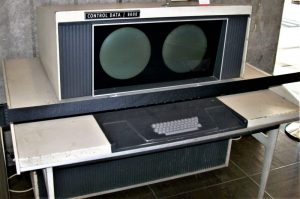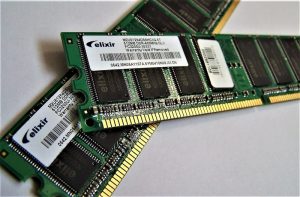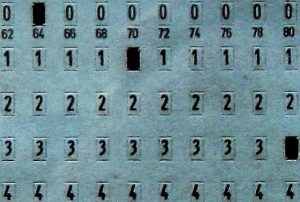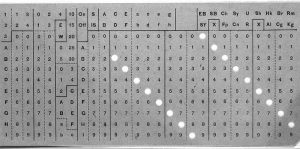Alan Turing
Alan Turing was born on 23 June 1912 in London. In his seminal article published in 1936, he succeeded in demonstrating that there can be no universal algorithmic method for determining truth in mathematics, and that mathematics will always have a series of undecidable propositions. That document also introduced the famous Turing machine. His works on the subject are widely recognized as the basis of research in artificial intelligence and in the creation of the modern computer.
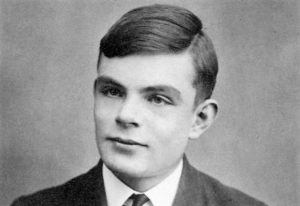
- Born: 23/06/1912
- Birthplace: Maida Vale, London, United Kingdom
- When did he die: 07/06/1954
- Where he died: Wilms low, United Kingdom
Who was Alan Turing?
He was a mathematician, logical, computer scientist, cryptographer, philosopher and British ultra-distance runner. He is considered as one of the fathers of computing, precursor of modern computing and part of the formalization of the algorithm and computing concept.
Alan Turing biography
Alan Turing was born on 23 June 1912 in London, England. Son of Julius Mathison Turing and Ethel Sara Stoney. He spent much of his childhood in India with his parents where he undertook several important studies from an early age.
In 1936 he published his important study “The computable numbers”, with an application to the Entscheidungsproblem”, Alan Turing formulated again the results of Kurt Gödel in 1931 on the limits of the demonstrability and the computation, changing to the universal formal language by what today is known as Turing machine. He also found that the machine could solve any mathematical problem that could be represented by an algorithm.
Alan Turing carried out several works with Norbert Wiener in the development of cybernetics, which was generated from the demand for control systems that they demanded in the development of production techniques from the twentieth century.
In 1952, he went to the police to report a robbery and during the statement indicated his homosexuality, for which he was accused of serious indecency and sexual perversion, which at that time it was considered serious crimes in the United Kingdom. He was given a choice between prison or chemical castration and opted for the last, which produced physical changes affecting his work.
Alan Mathison Turing died in Wilms low, Cheshire, on 7 June 1954 after being given a poison, perhaps by accident. His mother argued that the death was due to accidental ingestion of cyanide from his fingers after a chemical experiment, but it is more credible that he planned his death.
Education
In his childhood, Alan Turing lived in India, since his father worked in the Colonial Administration of the country. He showed great interest in reading, puzzles and numbers. At the age of 6, he began his studies at St. Michael’s College and at the age of 8 his interest in knowledge and chemical experimentation was so deep that he designed a small laboratory at home.
In 1926 he began his studies at Sherburne’s boarding school in Dorset, where he met and befriended Christopher Morcom who died sometime later, which was a great blow for Alan Turing, so much so that he became an atheist. The young man began to incline towards mathematics and science, an attitude that he did not attribute to him by winning a large part of the mathematical prizes given at school.
He studied at King’s College, Cambridge University and Princeton University, where he worked with the logical Alonzo Church and was appointed professor at King’s College. In 1936, Alonzo Church and Alan Turing demonstrated that it was impossible to write the problem of decision, which sought to find a general algorithm that would decide whether a first-order calculation formula is a theorem.
In 1938, he returned to England to study philosophy of mathematics where he obtained his PhD in Princeton; in his speech he raised the concept of hyper computation, in which he deepened the Turing machines with the so-called oracle machines, which could study the problems that had no algorithmic solution.
Inventions by Alan Turing
Among his most important inventions we mention the following:
- Turing machine: artifact to perform systematic tasks related to computational concepts of input, output and programs.
- Secret Codes and Pump: he was hired by the government to decipher the German codes known as Enigma during the Second World War.
- ACE computer and artificial intelligence: he created a computer that allowed data to be stored, but he did not build it and wrote the book Computational Machinery and Intelligence related to artificial intelligence.
Contributions by Alan Turing
His contributions to modern computers were one of Alan Turing’s most important aspects. Thanks to him, today we have programming and mathematics. He contributed in the area of programming development and the codes that are used in computers. He also took the first step in defining artificial intelligence which could resemble human intelligence in terms of effectiveness and task accomplishment.
Importance
His importance has been compared to that of Churchill and other leaders, although his ideas and inventions were hidden for reasons of national security in times of war. Thanks to him, today we can do different things with a computer, from writing texts and saving them, surfing the Internet, listening to music, and we don’t have to change the device for each of those actions. In addition, he is considered the father of artificial intelligence.
Acknowledgements
A statue of Turing in Manchester was inaugurated on 23 June 2001. This statue is located in Sackville Park, between the Manchester University building. On the 50th anniversary of his death, a commemorative plaque was unveiled at his former home, Hollymeade, in Wilms low on June 7, 2004.
Each year, the National Association for Computing Machinery awards the Turing Award to individuals who have made outstanding technical contributions to the world of computing.
The Alan Turing Institute was inaugurated by the Institute of Science and Technology of Manchester University and Manchester University in the summer of 2004.
On 5 June 2004, a commemorative event of his life and work was held at Manchester University, organized by the British Logic Colloquium and the British Society for the History of Mathematics.
On 28 October 2004, a bronze statue of Alan Turing sculpted by John W. Mills was unveiled at the University of Surrey. On 23 June 2012, the day commemorating the centenary of Turing’s birth, Google presented among its usual doodles a small Turing machine capable of comparing two strings of binary characters.
Alan Turing phrases
Some of his most recognized phrases in the world are:
- I am often surprised by machines.
- Mathematical reasoning can rather be considered schematically as the exercise of a combination of two installations, which we can call intuition and ingenuity.
- The idea behind digital computers can be explained by saying that these machines are intended to carry out any operation that can be performed by a human team.
- Science is a differential equation. Religion is a frontier condition.
How to cite this article?
Briceño V., Gabriela. (2019). Alan Turing. Recovered on 3 January, 2025, de Euston96: https://www.euston96.com/en/alan-turing-en/



